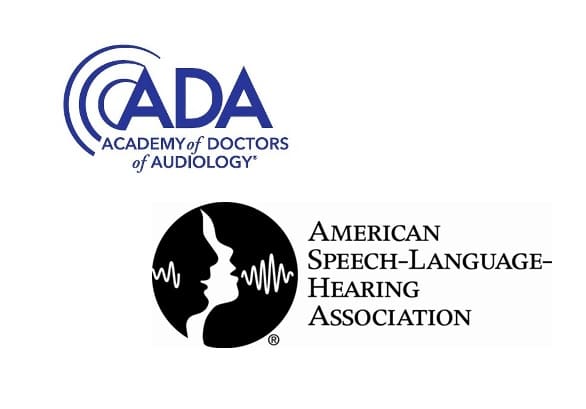LEXINGTON, KENTUCKY — In a strongly worded statement issued on April 13, the Academy of Doctors of Audiology (ADA) accused the American Speech-Language Hearing Association (ASHA) of attempting to expand the scope of practice for Speech-Language Pathologists to include audiology services.
According to the statement, ASHA’s leadership has recently advocated the inclusion of hearing conservation within the SLP scope of practice to “promote the use of work-site hearing protection” and “institute school and community based hearing conservation programs”.
ADA says that it also takes issue with language within ASHA’s 2014 Model Bill for State Licensure document that includes provisions for “screening individuals for hearing loss or middle ear pathology using conventional pure-tone air conduction methods (including otoscopic inspection), otoacoustic emissions screening, and/or screening tympanometry.”
ADA Makes Position Clear

Rita Chaiken, AuD, ADA President
In a letter to ASHA leadership, ADA says they applaud the removal of some of the previously concerning language used, but continue to strongly believe that adding hearing conservation services to the SLP scope of practice is inappropriate.
ADA is shocked and disappointed that ASHA has assigned an area of expertise to SLPs for which they are not properly educated, trained or licensed. Any unfounded expansion of the SLP scope of practice, which includes the independent provision of hearing conservation services, puts noise-exposed workers and the public at risk.
—Rita Chaiken, AuD
ADA has urged ASHA to completely remove the recommendation that hearing conservation services be included in the SLP scope of practice altogether. They have urged their membership, particularly those who are also members of ASHA, to demand removal of services from the proposed SLP scope of practice that is reserved to the profession of audiology.
Read the full ADA letter here.







Contrary to what is claimed in “ADA Says ASHA Trying to Expand SLP Scope of Practice to include Audiology,” nothing could be further from the truth. Instead, the American Speech-Language-Hearing Association (ASHA) Board of Directors (BOD) has simply rescinded the recently revised Scope of Practice (SOP) for speech language pathology.
The speech language pathology SOP document contained the following language about Hearing Conservation in a section about Prevention and Wellness: “Target prevention of noise-induced hearing loss (e.g. promote the use of work-site hearing protection, and institute school and community-based hearing conservation programs).” It did not say anything about speech language pathologists implementing, overseeing or providing hearing conservation as that was not the intent. However, when some audiology members raised concerns that language could be mis-interpreted, the BOD took action immediately to refer the document back to the committee asking that the language be revised in a manner that is unambiguously clear.
With regard to screening, both audiology and speech-language pathology have language in their respective SOP documents that covers screening of each other’s area of the communication disorder spectrum. The current Audiology SOP has language (in Professional Roles & Activities; Identification – items 3) & 5) – regarding the role of Audiologists “screening for speech, orofacial and myofunctional disorders, language, cognitive communication disorders”; and “in collaboration with speech-language pathologists identify populations and individuals at risk for developing speech and language disorders.”
A mutual, interprofessional relationship has existed for many years with regard to screening – which is the process of identifying the possible presence of an undiagnosed condition, for the purpose of making an appropriate referral. Screening is not assessing, diagnosing or treating – just identifying the possible presence, then referring – in the case of a potential hearing or hearing related issue, to an audiologist. Screening facilitates the early identification of speech-language and hearing issues that can then be referred on to their respective professional practitioners for diagnosis and treatment.
It is unfortunate that the speech-language pathology SOP language has been misinterpreted and broadcast in such an inaccurate and unnecessary way. However, now that it has been, we want to set the record straight: Reciprocal screening has been in existence for years, and it is in the best interests of patients, the public, and the professions. There is no encroachment or impingement on the scope of practice of either audiologists or speech-language pathologists.
<“Target prevention of noise-induced hearing loss (e.g. promote the use of work-site hearing protection, and institute school and <community-based hearing conservation programs).”
<It did not say anything about speech language pathologists implementing, overseeing or providing hearing conservation as that
<was not the intent.
Possibly I am easily confused by big words, but when I was a new graduate working in West Virginia I had a consulting business outside of Charleston Area Medical Center. I spoke with companies and helped target ways to prevent noise-induced hearing loss. I helped set up hearing conservation programs at coal washing stations, set up safe level noise areas at the AMC plant. Counseled workers on the fact that noise is not just at work, but at home and the local pub as well.
I promoted the use of workplace hearing protection and to continue it after work as well. This was in the 1970s so this was new, but what you are stating sounds very much like cracking the door open a bit, the same way I was cracking open the door from the Acoustical Engineers and Architects when I started. Wording for doing and wording to refer are different.
I hope that ASHA Will have the self-respect to admit that the wording AND their example of explanation need to be reviewed and rewritten.